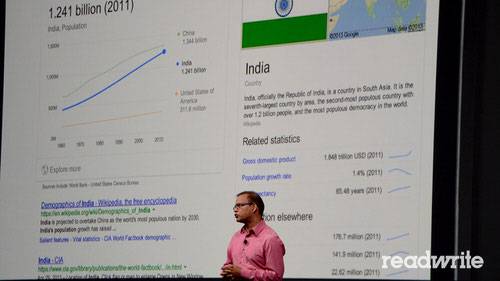
Amid a blizzard of announcements at its I/O conference, Google unveiled a major change to its core search product in singularly low-key fashion.
Amit Singhal, a senior Google executive in charge of its search efforts, said that Google search, starting today, wouldn’t just answer the question implied in the words we type into that ubiquitous search box. Google, Singhal said, would display results that “anticipate the next question.”
Singhal gave the example of a search for “the population of India.” The searcher wants a number, yes—but it’s likely that they’re on the hunt for more information about India after that. There’s no reason why Google shouldn’t get a jump start on answering those questions.
That word Singhal used—”anticipate”—is a powerful one in the field of artificial intelligence. Anticipatory systems, as we’ve written, are a hot field that’s been moving from theory to practice. There are apps today that will recommend a restaurant, a purchase, even a date. And we’ve noted how anticipatory systems are the future of search.
But with this latest update, Google is launching the biggest real-world experiment in anticipatory systems ever, with hundreds of millions of its search users getting a glimpse of the anticipatory future today.
Google Maps, too, is getting an anticipatory update. Search for the “Walt Disney Family Museum,” a popular San Francisco institution, and you might get another kid-friendly museum suggested, like the Exploratorium, based on the reasonable assumption that you’re looking for a place to go with your family.
Singhal said the goal was to introduce “conversational search.” To have a conversation, you need a conversational partner. The voice search features Google rolled out will likely get far more attention. But the anticipatory underpinnings of Google’s new search are far more crucial. Human beings are remarkably good at processing context to anticipate what the people we’re talking to will say next. Now we can really talk to Google. Whether it’s through a keyboard, touchscreen, or microphone doesn’t really matter.
Photo by Nick Statt for ReadWrite

















